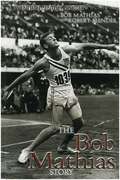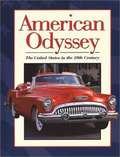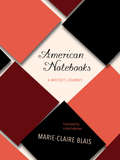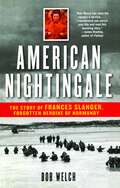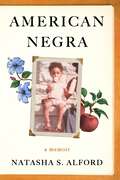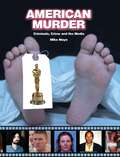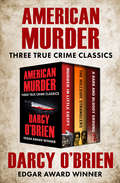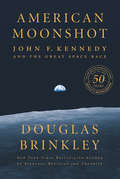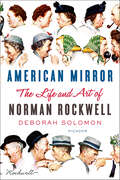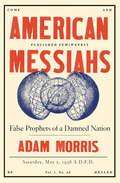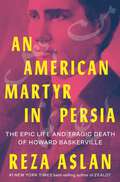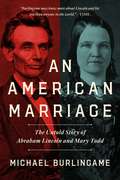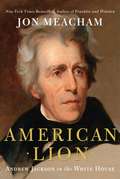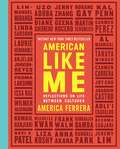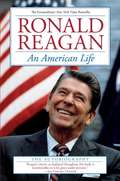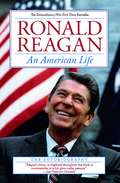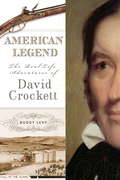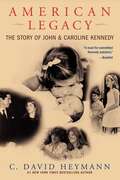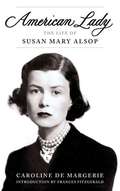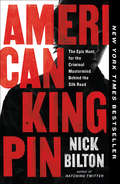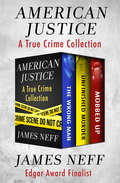- Table View
- List View
An American Odyssey: The Bob Mathias Story
by Bob Mathias Robert MendesBob Mathias is a true 20th-century American hero. The youngest man ever to win the Olympic decathlon gold medal, and the only American ever to win it twice, Mathias was also a movie star, U.S. Marine, writer, four-term congressman, and architect of America's Olympic renaissance. In addition, he was recently named by both ESPN and the Associated Press as one of the century's 100 greatest athletes. In his autobiography, this American original offers incisive comments on many of the famous people and events he witnessed during his long and distinguished career of public service. He talks about the old-fashioned values he grew up with, and how they still have a place in a changing culture. He discusses the current state of athletics, what colleges should be doing for their scholarship athletes but aren't, the total collapse of "amateurism" worldwide, and the million-dollar salaries being paid to mediocre athletes. He also offers practical, down-to-earth solutions to many of the problems he sees facing not only athletics, but also our country and the world. This book is a lively, well-written account of a unique life, lived to its fullest potential, and includes some never-before-published pictures that can only be described as collectors' items.
American Odyssey: The United States In The 20th Century
by Gary B. NashThe Americas had long been the home to a rich variety of Native American cultures. Hundreds of years ago, however, other peoples-- Europeans and enslaved Africans--set foot in what was to them a new world. Together they created the United States of America--a nation founded on the promise of liberty and equality for all the diverse people who have contributed to its success.
American Notebooks: A Writer's Journey
by Marie-Claire BlaisIt is the spring of 1963. The young Quebec author Marie-Claire Blais, bursting with energy and talent, has just won a coveted Guggenheim fellowship. She chooses Cambridge, Massachusetts, as the place where she will begin her writer's apprenticeship with her mentor, Edmund Wilson. American Notebooks is much more than a fascinating autobiographical account of the intellectual flowering of a great writer. An album of exquisitely drawn literary portraits of companions, intellectuals, writers, musicians, artists and social activists of the period--Edmund and Elena Wilson; Mary Meigs; Maud Maugan; Barbara Deming; Truman Capote; Jacques Hébert, her first Quebec publisher, then senator; and many others--it also introduces many of the real life personalities who have inspired her fictional characters.
American Nightingale: The Story of Frances Slanger, Forgotten Heroine of Normandy
by Bob WelchOf the 350,000 American women in uniform during World War II, none instilled more hope in American GIs than Frances Slanger. In Army fatigues and helmet she splashed ashore with the first nurses to hit the Normandy beach in June 1944. Later, from a storm-whipped tent amid the thud of artillery shells, she wrote a letter to Stars and Stripes newspaper that would stir the souls of thousands of weary soldiers. Hundreds wrote heartfelt responses, praising Slanger and her fellow nurses and honoring her humility and patriotism. But Frances Slanger never got to read such praise. She was dead, killed the very next day when German troops shelled her field hospital, the first American nurse to die in Europe after the landing at Normandy. Frances Slanger was a Jewish fruit-peddler's daughter who survived a chilling childhood in World War I-torn Poland and immigrated to America at age seven. Inspired by memories of her bitter past and a Nazi-threatened future, she defied her parents' wishes by becoming a nurse and joining the military. A woman of great integrity and courage, she was also a passionate writer and keeper of chapbooks. This is the story of her too brief life.
American Negra: A Memoir
by Natasha S. AlfordAward-winning journalist Natasha S. Alford grew up between two worlds as the daughter of an African American father and Puerto Rican mother. In American Negra, a narrative that is part memoir, part cultural analysis, Alford reflects on growing up in a working-class family from the city of Syracuse, NY.In smart, vivid prose, Alford illustrates the complexity of being multiethnic in Upstate New York and society’s flawed teachings about matters of identity. When she travels to Puerto Rico for the first time, she is the darkest in her family, and navigates shame for not speaking Spanish fluently. She visits African-American hair salons where she’s told that she has “good” hair, while internalizing images that as a Latina she has "bad” hair or pelo malo.When Alford goes from an underfunded public school system to Harvard University surrounded by privilege and pedigree, she wrestles with more than her own ethnic identity, as she is faced with imposter syndrome, a shocking medical diagnosis, and a struggle to define success on her own terms. A study abroad trip to the Dominican Republic changes her perspective on Afro-Latinidad and sets her on a path to better understand her own Latin roots.Alford then embarks on a whirlwind journey to find her authentic voice, taking her across the United States from a hedge fund boardroom to a classroom and ultimately a newsroom, as a journalist. A coming-of-age story about what it's like to live at the intersections of race, culture, gender, and class, all while staying true to yourself, American Negra is a captivating look at one woman’s experience being Negra in the United States. As the movement to highlight Afro-Latin identity and overlooked histories of the African diaspora grows, American Negra illustrates the diversity of the Black experience in the larger fabric of American society.
American Murder
by Mike MayoInvestigating the way Hollywood scoops up notorious criminals and turns them into legends, this entertaining who's-who guide provides thumbnail sketches of such killers as Ma Barker, Black Beard, Al Capone, John Wesley Hardin, and Charles Starkweather. Noting that some figures are glamorized in popular culture (Jesse James), while others are demonized (Charles Manson), this encyclopedic collection explores the legends' emotional truths as depicted in movies, stories, and songs. Facts of the real cases behind these notorious criminals are also presented, including the landmark rulings that pioneered new approaches to criminal justice.
American Murder: Three True Crime Classics
by Darcy O'BrienThree “riveting” accounts of horrific crimes and the twisted minds behind them by an Edgar Award–winning author (Publishers Weekly). A father’s ultimate betrayal, a savage killing spree that terrorized Los Angeles, and the brutal slaying of a rich man’s college-aged daughter. In this heart-stopping true crime collection, New York Times–bestselling author Darcy O’Brien uncovers the dark underside of the American dream. Murder in Little Egypt: Dr. John Dale Cavaness selflessly attended to the needs of his small, southern Illinois community. But when Cavaness was charged with the murder of his son Sean in December 1984, a radically different portrait of the physician and surgeon emerged. Throughout the three decades he had basked in the admiration and respect of the people of Little Egypt, Cavaness was privately terrorizing his family, abusing his employees, and making disastrous financial investments. In this New York Times bestseller, as more and more grisly details come to light, so too does rural America’s heritage of blood and violence become clear. The Hillside Stranglers: For weeks, the body count of sexually violated, brutally murdered young women escalated. With increasing alarm, Los Angeles newspapers headlined the deeds of a serial killer they named the Hillside Strangler. But not until January 1979, more than a year later, would the mysterious disappearance of two university students near Seattle lead police to the arrest of a security guard—the handsome, charming, fast-talking Kenny Bianchi—and the discovery that the strangler was not one man but two. The Hillside Stranglers is the disturbing portrait of a city held hostage by fear and a pair of psychopaths whose lust was as insatiable as their hate. A Dark and Bloody Ground: On a sweltering evening in August 1985, three men breached Roscoe Acker’s alarm and security systems, stabbed his daughter to death, and made off with over $1.9 million in cash. The killers were part of a hillbilly gang led by Sherry Sheets Hodge, a former prison guard, and her husband, lifetime criminal Benny Hodge. The stolen money came in handy shortly afterward, when they used it to lure Kentucky’s most flamboyant lawyer, Lester Burns, into representing them. “The smell of wet, coal-laden earth, white lightning, and cocaine-driven sweat rises from these marvelously atmospheric—and compelling—pages” (Kirkus Reviews).
American Moonshot: John F. Kennedy and the Great Space Race
by Douglas BrinkleyAs the fiftieth anniversary of the first lunar landing approaches, the award winning historian and perennial New York Times bestselling author takes a fresh look at the space program, President John F. Kennedy’s inspiring challenge, and America’s race to the moon. <P><P>“We choose to go to the Moon in this decade and do the other things, not because they are easy, but because they are hard; because that goal will serve to organize and measure the best of our energies and skills, because that challenge is one that we are willing to accept, one we are unwilling to postpone, and one we intend to win.”—President John F. Kennedy <P><P>On May 25, 1961, JFK made an astonishing announcement: his goal of putting a man on the moon by the end of the decade. In this engrossing, fast-paced epic, Douglas Brinkley returns to the 1960s to recreate one of the most exciting and ambitious achievements in the history of humankind. <P><P>American Moonshot brings together the extraordinary political, cultural, and scientific factors that fueled the birth and development of NASA and the Mercury, Gemini and Apollo projects, which shot the United States to victory in the space race against the Soviet Union at the height of the Cold War. <P><P>Drawing on new primary source material and major interviews with many of the surviving figures who were key to America’s success, Brinkley brings this fascinating history to life as never before. <P><P>American Moonshot is a portrait of the brilliant men and women who made this giant leap possible, the technology that enabled us to propel men beyond earth’s orbit to the moon and return them safely, and the geopolitical tensions that spurred Kennedy to commit himself fully to this audacious dream. <P><P>Brinkley’s ensemble cast of New Frontier characters include rocketeer Wernher von Braun, astronaut John Glenn and space booster Lyndon Johnson. <P><P>A vivid and enthralling chronicle of one of the most thrilling, hopeful, and turbulent eras in the nation’s history, American Moonshot is an homage to scientific ingenuity, human curiosity, and the boundless American spirit. <P><b>A New York Times Bestseller</b>
American Mirror: The Life and Art of Norman Rockwell
by Deborah SolomonA NEW YORK TIMES BOOK REVIEW NOTABLE BOOK OF THE YEAR A FINALIST FOR THE LOS ANGELES TIMES BOOK PRIZE IN BIOGRAPHY AND SHORTLISTED FOR THE PEN/JACQUELINE BOGRAD WELD AWARD FOR BIOGRAPHY"Welcome to Rockwell Land," writes Deborah Solomon in the introduction to this spirited and authoritative biography of the painter who provided twentieth-century America with a defining image of itself. As the star illustrator of The Saturday Evening Post for nearly half a century, Norman Rockwell mingled fact and fiction in paintings that reflected the we-the-people, communitarian ideals of American democracy. Freckled Boy Scouts and their mutts, sprightly grandmothers, a young man standing up to speak at a town hall meeting, a little black girl named Ruby Bridges walking into an all-white school—here was an America whose citizens seemed to believe in equality and gladness for all.Who was this man who served as our unofficial "artist in chief" and bolstered our country's national identity? Behind the folksy, pipe-smoking façade lay a surprisingly complex figure—a lonely painter who suffered from depression and was consumed by a sense of inadequacy. He wound up in treatment with the celebrated psychoanalyst Erik Erikson. In fact, Rockwell moved to Stockbridge, Massachusetts so that he and his wife could be near Austen Riggs, a leading psychiatric hospital. "What's interesting is how Rockwell's personal desire for inclusion and normalcy spoke to the national desire for inclusion and normalcy," writes Solomon. "His work mirrors his own temperament—his sense of humor, his fear of depths—and struck Americans as a truer version of themselves than the sallow, solemn, hard-bitten Puritans they knew from eighteenth-century portraits."Deborah Solomon, a biographer and art critic, draws on a wealth of unpublished letters and documents to explore the relationship between Rockwell's despairing personality and his genius for reflecting America's brightest hopes. "The thrill of his work," she writes, "is that he was able to use a commercial form [that of magazine illustration] to thrash out his private obsessions." In American Mirror, Solomon trains her perceptive eye not only on Rockwell and his art but on the development of visual journalism as it evolved from illustration in the 1920s to photography in the 1930s to television in the 1950s. She offers vivid cameos of the many famous Americans whom Rockwell counted as friends, including President Dwight Eisenhower, the folk artist Grandma Moses, the rock musician Al Kooper, and the generation of now-forgotten painters who ushered in the Golden Age of illustration, especially J. C. Leyendecker, the reclusive legend who created the Arrow Collar Man.Although derided by critics in his lifetime as a mere illustrator whose work could not compete with that of the Abstract Expressionists and other modern art movements, Rockwell has since attracted a passionate following in the art world. His faith in the power of storytelling puts his work in sync with the current art scene. American Mirror brilliantly explains why he deserves to be remembered as an American master of the first rank.
American Military Life In The 21st Century: Social, Cultural, And Economic Issues And Trends
by Eugenia Weiss Carl CastroAmerican Military Life in the 21st Century <P><P> Social, Cultural, and Economic Issues and Trends <P><P> VOLUME I: Active Duty Life
American Military Life In The 21st Century: Social, Cultural, And Economic Issues And Trends
by Eugenia Weiss Carl CastroAmerican Military Life in the 21st Century <P><P> Social, Cultural, and Economic Issues and Trends <P><P> VOLUME 2: Life of Military Families, National Guardsmen and Reservists, and Veterans
American Messiahs: False Prophets Of A Damned Nation
by Adam MorrisA history with sweeping implications, American Messiahs challenges our previous misconceptions about “cult” leaders and their messianic power. Mania surrounding messianic prophets has defined the national consciousness since the American Revolution. From Civil War veteran and virulent anticapitalist Cyrus Teed, to the dapper and overlooked civil rights pioneer Father Divine, to even the megalomaniacal Jim Jones, these figures have routinely been dismissed as dangerous and hysterical outliers. After years of studying these emblematic figures, Adam Morris demonstrates that messiahs are not just a classic trope of our national culture; their visions are essential for understanding American history. As Morris demonstrates, these charismatic, if flawed, would-be prophets sought to expose and ameliorate deep social ills—such as income inequality, gender conformity, and racial injustice. Provocative and long overdue, this is the story of those who tried to point the way toward an impossible “American Dream”: men and women who momentarily captured the imagination of a nation always searching for salvation.
An American Martyr in Persia: The Epic Life And Tragic Death Of Howard Baskerville
by Reza AslanIn this erudite and piercing biography, best-selling author Reza Aslan proves that one person’s actions can have revolutionary consequences that reverberate the world over. Little known in America but venerated as a martyr in Iran, Howard Baskerville was a twenty-two-year-old Christian missionary from South Dakota who traveled to Persia (modern-day Iran) in 1907 for a two-year stint teaching English and preaching the gospel. He arrived in the midst of a democratic revolution—the first of its kind in the Middle East—led by a group of brilliant young firebrands committed to transforming their country into a fully self-determining, constitutional monarchy, one with free elections and an independent parliament. The Persian students Baskerville educated in English in turn educated him about their struggle for democracy, ultimately inspiring him to leave his teaching post and join them in their fight against a tyrannical shah and his British and Russian backers. “The only difference between me and these people is the place of my birth," Baskerville declared, “and that is not a big difference.” In 1909, Baskerville was killed in battle alongside his students, but his martyrdom spurred on the revolutionaries who succeeded in removing the shah from power, signing a new constitution, and rebuilding parliament in Tehran. To this day, Baskerville’s tomb in the city of Tabriz remains a place of pilgrimage. Every year, thousands of Iranians visit his grave to honor the American who gave his life for Iran. In this rip-roaring tale of his life and death, Aslan gives us a powerful parable about the universal ideals of democracy—and to what degree Americans are willing to support those ideals in a foreign land. Woven throughout is an essential history of the nation we now know as Iran—frequently demonized and misunderstood in the West. Indeed, Baskerville’s life and death represent a “road not taken” in Iran. Baskerville’s story, like his life, is at the center of a whirlwind in which Americans must ask themselves: How seriously do we take our ideals of constitutional democracy and whose freedom do we support?
An American Marriage: The Untold Story of Abraham Lincoln and Mary Todd
by Michael BurlingameAn enlightening narrative exploring an oft-overlooked aspect of the sixteenth president's life, An American Marriage reveals the tragic story of Abraham Lincoln&’s marriage to Mary Todd.Abraham Lincoln was apparently one of those men who regarded &“connubial bliss&” as an untenable fantasy. During the Civil War, he pardoned a Union soldier who had deserted the army to return home to wed his sweetheart. As the president signed a document sparing the soldier's life, Lincoln said: &“I want to punish the young man—probably in less than a year he will wish I had withheld the pardon.&” Based on thirty years of research, An American Marriage describes and analyzes why Lincoln had good reason to regret his marriage to Mary Todd. This revealing narrative shows that, as First Lady, Mary Lincoln accepted bribes and kickbacks, sold permits and pardons, engaged in extortion, and peddled influence. The reader comes to learn that Lincoln wed Mary Todd because, in all likelihood, she seduced him and then insisted that he protect her honor. Perhaps surprisingly, the 5&’2&” Mrs. Lincoln often physically abused her 6&’4&” husband, as well as her children and servants; she humiliated her husband in public; she caused him, as president, to fear that she would disgrace him publicly. Unlike her husband, she was not profoundly opposed to slavery and hardly qualifies as the &“ardent abolitionist&” that some historians have portrayed. While she providid a useful stimulus to his ambition, she often &“crushed his spirit,&” as his law partner put it. In the end, Lincoln may not have had as successful a presidency as he did—where he showed a preternatural ability to deal with difficult people—if he had not had so much practice at home.
American Machiavelli
by John Lamberton HarperAlexander Hamilton (1757-1804) was an illegitimate West Indian emigrant who became the first U. S. Secretary of the Treasury. American Machiavelli focuses on Hamilton's controversial activities as foreign policy adviser and aspiring military leader. In the first major study of his foreign policy role in 30 years, John Lamberton Harper describes a decade of bitter division over the role of the Federal government in the economy during the 1790s and draws parallels between Hamilton and the sixteenth century Italian political adviser, Niccolò Machiavelli. Harper provides an original and highly readable account of Hamiltonas famous clashes with Thomas Jefferson and John Adams, and his key role in defining the U. S. national security strategy. John Lamberton Harper is Professor of Foreign Policy and European Studies at the Johns Hopkins University Bologna Center. He is the author of America and the Reconstruction of Italy, 1945-1948 (Cambridge 1986), winner of the 1987 Marraro Prize from the Society for Italian Historical Studies, and American Visions of Europe: Franklin D. Roosevelt, George F. Kennan, and Dean G. Asheson (Cambridge 1994), winner of the 1995 Robert Ferrell Prize from the Society of Historians of American Foreign Relations. His articles and reviews have appeared in numerous publications, including The American Historical Review, The Journal of American History, The Times Literary Supplement and Foreign Affairs.
American Lives and Legends
by John HoldrenThis book contains life stories of Young Benjamin Franklin, Phillis Wheatley, Paul Revere, Sybil Ludington, Sequoyah and stories of Washington Irving: Rip Van Winkle and The Legend of Sleepy Hollow.
American Lion: Andrew Jackson in the White House
by Jon MeachamAndrew Jackson, his intimate circle of friends, and his tumultuous times are at the heart of this remarkable book about the man who rose from nothing to create the modern presidency. Beloved and hated, venerated and reviled, Andrew Jackson was an orphan who fought his way to the pinnacle of power, bending the nation to his will in the cause of democracy. Jackson's election in 1828 ushered in a new and lasting era in which the people, not distant elites, were the guiding force in American politics. Democracy made its stand in the Jackson years, and he gave voice to the hopes and the fears of a restless, changing nation facing challenging times at home and threats abroad. To tell the saga of Jackson's presidency, acclaimed author Jon Meacham goes inside the Jackson White House. Drawing on newly discovered family letters and papers, he details the human drama-the family, the women, and the inner circle of advisers-that shaped Jackson's private world through years of storm and victory. One of our most significant yet dimly recalled presidents, Jackson was a battle-hardened warrior, the founder of the Democratic Party, and the architect of the presidency as we know it. His story is one of violence, sex, courage, and tragedy. With his powerful persona, his evident bravery, and his mystical connection to the people, Jackson moved the White House from the periphery of government to the center of national action, articulating a vision of change that challenged entrenched interests to heed the popular will-or face his formidable wrath. The greatest of the presidents who have followed Jackson in the White House-from Lincoln to Theodore Roosevelt to FDR to Truman-have found inspiration in his example, and virtue in his vision. Jackson was the most contradictory of men. The architect of the removal of Indians from their native lands, he was warmly sentimental and risked everything to give more power to ordinary citizens. He was, in short, a lot like his country: alternately kind and vicious, brilliant and blind; and a man who fought a lifelong war to keep the republic safe-no matter what it took. Jon Meacham in American Lion has delivered the definitive human portrait of a pivotal president who forever changed the American presidency-and America itself.<P><P> Pulitzer Prize Winner
American Like Me: Reflections on Life Between Cultures
by America FerreraFrom award-winning actress and political activist America Ferrera comes a vibrant and varied collection of first person accounts from prominent figures about the experience of growing up between cultures. <P><P>America Ferrera has always felt wholly American, and yet, her identity is inextricably linked to her parents’ homeland and Honduran culture. Speaking Spanish at home, having Saturday-morning-salsa-dance-parties in the kitchen, and eating tamales alongside apple pie at Christmas never seemed at odds with her American identity. Still, she yearned to see that identity reflected in the larger American narrative. <P><P>Now, in American Like Me, America invites thirty-one of her friends, peers, and heroes to share their stories about life between cultures. We know them as actors, comedians, athletes, politicians, artists, and writers. However, they are also immigrants, children or grandchildren of immigrants, indigenous people, or people who otherwise grew up with deep and personal connections to more than one culture. <P><P>Each of them struggled to establish a sense of self, find belonging, and feel seen. And they call themselves American enthusiastically, reluctantly, or not at all. Ranging from the heartfelt to the hilarious, their stories shine a light on a quintessentially American experience and will appeal to anyone with a complicated relationship to family, culture, and growing up. <P><b>A New York Times Bestseller</b>
An American Life: An Enhanced eBook with CBS Video
by Ronald ReaganRonald Reagan's autobiography is a work of major historical importance. Here, in his own words, is the story of his life--public and private--told in a book both frank and compellingly readable. Few presidents have accomplished more, or been so effective in changing the direction of government in ways that are both fundamental and lasting, than Ronald Reagan. Certainly no president has more dramatically raised the American spirit, or done so much to restore national strength and self-confidence. Here, then, is a truly American success story--a great and inspiring one. From modest beginnings as the son of a shoe salesman in Tampico, Illinois, Ronald Reagan achieved first a distinguished career in Hollywood and then, as governor of California and as president of the most powerful nation in the world, a career of public service unique in our history. Ronald Reagan's account of that rise is told here with all the uncompromising candor, modesty, and wit that made him perhaps the most able communicator ever to occupy the White House, and also with the sense of drama of a gifted natural storyteller. He tells us, with warmth and pride, of his early years and of the elements that made him, in later life, a leader of such stubborn integrity, courage, and clear-minded optimism. Reading the account of this childhood, we understand how his parents, struggling to make ends meet despite family problems and the rigors of the Depression, shaped his belief in the virtues of American life--the need to help others, the desire to get ahead and to get things done, the deep trust in the basic goodness, values, and sense of justice of the American people--virtues that few presidents have expressed more eloquently than Ronald Reagan. With absolute authority and a keen eye for the details and the anecdotes that humanize history, Ronald Reagan takes the reader behind the scenes of his extraordinary career, from his first political experiences as president of the Screen Actors Guild (including his first meeting with a beautiful young actress who was later to become Nancy Reagan) to such high points of his presidency as the November 1985 Geneva meeting with Mikhail Gorbachev, during which Reagan invited the Soviet leader outside for a breath of fresh air and then took him off for a walk and a man-to-man chat, without aides, that set the course for arms reduction and charted the end of the Cold War. Here he reveals what went on behind his decision to enter politics and run for the governorship of California, the speech nominating Barry Goldwater that first made Reagan a national political figure, his race for the presidency, his relations with the members of his own cabinet, and his frustrations with Congress. He gives us the details of the great themes and dramatic crises of his eight years in office, from Lebanon to Grenada, from the struggle to achieve arms control to tax reform, from Iran-Contra to the visits abroad that did so much to reestablish the United States in the eyes of the world as a friendly and peaceful power. His narrative is full of insights, from the unseen dangers of Gorbachev's first visit to the United States to Reagan's own personal correspondence with major foreign leaders, as well as his innermost feelings about life in the White House, the assassination attempt, his family--and the enduring love between himself and Mrs. Reagan. An American Life is a warm, richly detailed, and deeply human book, a brilliant self-portrait, a significant work of history.
An American Life
by Ronald ReaganRonald Reagan's autobiography is a work of major historical importance. Here, in his own words, is the story of his life--public and private--told in a book both frank and compellingly readable. Few presidents have accomplished more, or been so effective in changing the direction of government in ways that are both fundamental and lasting, than Ronald Reagan. Certainly no president has more dramatically raised the American spirit, or done so much to restore national strength and self-confidence. Here, then, is a truly American success story--a great and inspiring one. From modest beginnings as the son of a shoe salesman in Tampico, Illinois, Ronald Reagan achieved first a distinguished career in Hollywood and then, as governor of California and as president of the most powerful nation in the world, a career of public service unique in our history. Ronald Reagan's account of that rise is told here with all the uncompromising candor, modesty, and wit that made him perhaps the most able communicator ever to occupy the White House, and also with the sense of drama of a gifted natural storyteller. He tells us, with warmth and pride, of his early years and of the elements that made him, in later life, a leader of such stubborn integrity, courage, and clear-minded optimism. Reading the account of this childhood, we understand how his parents, struggling to make ends meet despite family problems and the rigors of the Depression, shaped his belief in the virtues of American life--the need to help others, the desire to get ahead and to get things done, the deep trust in the basic goodness, values, and sense of justice of the American people--virtues that few presidents have expressed more eloquently than Ronald Reagan. With absolute authority and a keen eye for the details and the anecdotes that humanize history, Ronald Reagan takes the reader behind the scenes of his extraordinary career, from his first political experiences as president of the Screen Actors Guild (including his first meeting with a beautiful young actress who was later to become Nancy Reagan) to such high points of his presidency as the November 1985 Geneva meeting with Mikhail Gorbachev, during which Reagan invited the Soviet leader outside for a breath of fresh air and then took him off for a walk and a man-to-man chat, without aides, that set the course for arms reduction and charted the end of the Cold War. Here he reveals what went on behind his decision to enter politics and run for the governorship of California, the speech nominating Barry Goldwater that first made Reagan a national political figure, his race for the presidency, his relations with the members of his own cabinet, and his frustrations with Congress. He gives us the details of the great themes and dramatic crises of his eight years in office, from Lebanon to Grenada, from the struggle to achieve arms control to tax reform, from Iran-Contra to the visits abroad that did so much to reestablish the United States in the eyes of the world as a friendly and peaceful power. His narrative is full of insights, from the unseen dangers of Gorbachev's first visit to the United States to Reagan's own personal correspondence with major foreign leaders, as well as his innermost feelings about life in the White House, the assassination attempt, his family--and the enduring love between himself and Mrs. Reagan. An American Life is a warm, richly detailed, and deeply human book, a brilliant self-portrait, a significant work of history.
American Legend: The Real-Life Adventures of David Crockett
by Buddy LevyDavid Crockett was an adventurer, a pioneer, and a tragic hero who died at the Alamo. But the life of the real Crockett has been largely obscured and overshadowed by his mythology, turning this honest, unassuming backwoodsman into a larger-than-life, Disney-fied character in a coonskin cap. <P> In his short but distinguished lifetime, Crockett became America's original celebrity, frequently written about in newspapers and becoming an integral part of the folklore of his day. Opportunistic and clever, and presciently media-savvy, Crockett parlayed his humble origins to his advantage, using his charismatic frontiersman persona to win elections as a three-time U.S. Congressman and even a nomination as presidential candidate. The 1834 publication of his memoir, A Narrative of the Life of David Crockett-by Himself, one of the first autobiographies of its kind, went through seven printings, and sent Crockett on the first-ever book tour across the Eastern seaboard. <P> At heart, Crockett was unassuming and down-to-earth, obstinate and independent to a fault. In a beautifully descriptive narrative, American Legend takes readers from Crockett's childhood hardships, near-death experiences, and meager education through his unlikely rise to Congress. Though his death at the Alamo on March 6, 1836, only added to his considerable fame and notoriety, the common David Crockett emerges here as never before: a rugged individual, an American original, and an enduring symbol of the American spirit
American Legacy: The Story of John & Caroline Kennedy
by C. David HeymannFrom the moment of their births, John and Caroline Kennedy occupied a central position in what is generally regarded as the most famous family in the United States, if not the world. Even as young children growing up in the White House, their most subtle gestures and actions made headlines.... Yet until now they have not been the subject of a dual biography. In that sense, this volume represents a first. In American Legacy, #1 New York Times bestselling author C. David Heymann draws upon a voluminous archive of personal interviews to present a telling portrait of John and Caroline Kennedy. A longtime biographer of various members of the Kennedy clan, including Jackie and Robert Kennedy, Heymann covers John's and Caroline's childhood in the White House, the dark aftermath of their father's assassination, their uneasy adolescence, and the many challenges they faced as adults, all under the glaring eye of the media. He reveals John's and Caroline's loving but at times trying relationship with their larger-than-life mother, as well as Jackie's own emotional struggles, romantic relationships, and financial concerns following JFK's death. Other revelations brought to light for the first time in American Legacy include the assassination attempt made on Jackie just before she gave birth to John; JFK Jr.'s romantic escapades prior to marrying Carolyn Bessette and accounts of the predominantly happy marriage they shared despite criticisms from questionable sources; the shocking report of the autopsy performed on John following the tragic plane crash that killed him, Carolyn, and her sister Lauren; Caroline's rise to become one of the wealthiest women in America and her life now as the sole keeper of her family's magnificently complex legacy. Utterly compelling and full of new and fascinating details, American Legacy overturns much of what we thought we knew about two of the most talked-about members of the Kennedy family.
American Lady: The Life of Susan Mary Alsop
by Caroline De MargerieThe fascinating story of one of the grand dames of Georgetown society and a true Washington insider Henry Kissinger once remarked that more agreements were concluded in the living room of Susan Mary Alsop than in the White House. A descendent of Founding Father John Jay, Susan Mary was an American aristocrat whose first marriage gave her full access to post-war diplomatic social life in Paris. There, her circle of friends included Winston Churchill, Isaiah Berlin, Evelyn Waugh, and Christian Dior, among other luminaries, and she had a passionate love affair with British ambassador Duff Cooper. During the golden years of John F. Kennedy’s presidency-after she had married the powerful journalist Joe Alsop-her Washington home was a gathering place for everyone of importance, including Katharine Graham, Robert McNamara, and Henry Kissinger. Dubbed "the second lady of Camelot,” she hosted dinner parties that were the epitome of political power and social arrival, bringing together the movers and shakers not just of the United States, but of the world. Featuring an introduction by Susan Mary Alsop’s goddaughter Frances FitzGerald, American Lady is a fascinating chronicle of a woman who witnessed, as Nancy Mitford once said, "history on the boil. ” .
American Kingpin: The Epic Hunt for the Criminal Mastermind Behind the Silk Road
by Nick BiltonThe unbelievable true story of the man who built a billion-dollar online drug empire from his bedroom—and almost got away with it In 2011, a twenty-six-year-old libertarian programmer named Ross Ulbricht launched the ultimate free market: the Silk Road, a clandestine Web site hosted on the Dark Web where anyone could trade anything—drugs, hacking software, forged passports, counterfeit cash, poisons—free of the government’s watchful eye. It wasn’t long before the media got wind of the new Web site where anyone—not just teenagers and weed dealers but terrorists and black hat hackers—could buy and sell contraband detection-free. Spurred by a public outcry, the federal government launched an epic two-year manhunt for the site’s elusive proprietor, with no leads, no witnesses, and no clear jurisdiction. All the investigators knew was that whoever was running the site called himself the Dread Pirate Roberts. The Silk Road quickly ballooned into $1.2 billion enterprise, and Ross embraced his new role as kingpin. He enlisted a loyal crew of allies in high and low places, all as addicted to the danger and thrill of running an illegal marketplace as their customers were to the heroin they sold. Through his network he got wind of the target on his back and took drastic steps to protect himself—including ordering a hit on a former employee. As Ross made plans to disappear forever, the Feds raced against the clock to catch a man they weren’t sure even existed, searching for a needle in the haystack of the global Internet. Drawing on exclusive access to key players and two billion digital words and images Ross left behind, Vanity Fair correspondent and New York Times bestselling author Nick Bilton offers a tale filled with twists and turns, lucky breaks and unbelievable close calls. It’s a story of the boy next door’s ambition gone criminal, spurred on by the clash between the new world of libertarian-leaning, anonymous, decentralized Web advocates and the old world of government control, order, and the rule of law. Filled with unforgettable characters and capped by an astonishing climax, American Kingpin might be dismissed as too outrageous for fiction. But it’s all too real.
American Justice: A True Crime Collection
by James NeffThree shocking tales of violence, intrigue, and the search for truth from a two-time Edgar Award finalist and Ann Rule&’s &“favorite true-crime writer.&” In this riveting collection, prize-winning investigative journalist James Neff examines the Dr. Sam Sheppard murder mystery; the terrifying pursuit of a serial rapist in Cleveland, Ohio; and the spectacular rise and fall of Teamster boss Jackie Presser. The Wrong Man: In 1954, in suburban Cleveland, Dr. Sam Sheppard&’s wife, Marilyn, was beaten to death in their home. Investigators, the press, the public, and the courts worked in lockstep to convict Sheppard. Sentenced to life in prison, he served nearly a decade before he was acquitted in a retrial. Culled from DNA evidence, testimony that was never heard in court, prison diaries, and interviews with key players, The Wrong Man makes a convincing case for Sheppard&’s innocence and reveals the identity of the true killer. &“Gripping and meticulously researched . . . [A] first-degree murder mystery&” (People). Unfinished Murder: From 1983 to 1988, serial rapist Ronnie Shelton preyed on the women of Cleveland. Dubbed the West Side Rapist, he spied on his victims, stalked them, and brutally assaulted them in their homes. Arrested at least fifteen times for other crimes, Shelton slipped through the cracks of the justice system so often it seemed he&’d never be caught—until his courageous victims united to put him behind bars. A finalist for the Edgar Award, Unfinished Murder is based on more than 150 interviews with the survivors, the police, psychiatrists, and Shelton himself, who was sentenced to 3,195 years in prison, the longest in Ohio state history. Mobbed Up: As the president of America&’s largest labor union, Jackie Presser navigated a dangerous balancing act with the Teamsters, the Mafia, and the Justice Department. At the same time he was taking orders from New York mob boss Fat Tony Salerno, Presser was serving as the FBI&’s top informant on organized crime. Drawing on thousands of pages of classified files, Neff follows the trail of greed and hubris all the way to the Nixon and Reagan White Houses, where Presser was treated as a valued friend. &“[A] damning tale . . . A portrait of pervasive corruption that should concern anyone who cares about the way this country works&” (Los Angeles Times).
